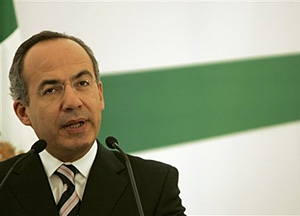 |
 |
 |
 News Around the Republic of Mexico | September 2006 News Around the Republic of Mexico | September 2006  
Mexico's President-Elect Presents Agenda
 Julie Watson - Associated Press Julie Watson - Associated Press


| | Mexican President-elect Felipe Calderon speaks at his headquarters in Mexico City, Mexico on Thursday Sept. 28, 2006. Calderon spoke about the themes he will put forward to discuss with the Legislative branch. (AP/Dario Lopez-Mills) |
President-elect Felipe Calderon unveiled his agenda Thursday for the one institution many believe can unite the divided nation — Mexico's Congress.

Speaking from his transition headquarters, Calderon asked Congress to get tougher on criminals, create a universal health care system and generate jobs so millions of Mexicans do not have to migrate to the U.S. to find work.

Calderon also called for reducing the gap between rich and poor, making it clear his conservative government will be shaped in part by proposals of his leftist rival, Andres Manuel Lopez Obrador, who has fashioned himself as the savior of the poor.

Mexico has been mired in political strife since Calderon, a former energy secretary, narrowly won the July 2 elections over Lopez Obrador, who cried fraud and says he will not recognize the incoming administration.

After Calderon spoke, Lopez Obrador supporters tried to block the door to Calderon's transition headquarters, yelling "You shall not pass lackey!" They also tried to pin signs to the building, but were stopped by Calderon's security officers. There was pushing and shoving between protesters and security agents but no major injuries were reported. More than 20 federal police with riot shields guarded the building afterward.

Newly elected lawmakers from Calderon's National Action Party have already been making peace overtures, drafting social packages and electoral reforms aimed at winning over the millions of voters who believe the ruling party stole the election.

All eight parties in the lower house have expressed support for a proposal by Lopez Obrador's party to expand a pension program for the elderly he enacted as mayor of Mexico City to the national level.

At Thursday's news conference, Calderon called for a return to life sentences for hardened criminals, including violent kidnappers. Mexico has one of the highest kidnapping rates in the world.

Calderon said he also wants to make Mexico's still developing democracy more effective, imposing stricter regulations on campaign spending, allowing re-election of lawmakers and mayors and tightening anti-corruption laws.

The three leading parties in Congress also agree the country needs political reforms. The 2006 presidential race was among Mexico's most vicious, starting a national discussion about how far candidates can go in their battle for the country's top post.

Lawmakers say they will consider implementing a presidential runoff to avoid future disputes. Lopez Obrador and Calderon each finished with less than 36 percent of the vote in a five-way race. Calderon was declared the winner with an advantage of just over 230,000 votes more than Lopez Obrador.

"In the end, we have more similarities than differences when we're talking about Mexico's future," said Congressman Cesar Camacho of the Institutional Revolutionary Party, or PRI.

Unlike outgoing President Vicente Fox, whose agenda was blocked for six years by a hostile, opposition-led Congress, Calderon will enjoy the largest legislative bloc in both houses.

While his party will still need the support of the others to pass legislation, the PRI has indicated it is willing to back National Action on many proposals. Observers say the PRI, which lost the presidency to Fox in 2000 after 71 years in power, is fighting for its survival and sees playing peacemaker as a way to win back the trust of Mexicans.

After it became clear the presidential vote was too close to call, Lopez Obrador's supporters blocked the heart of the capital for seven weeks with a sprawling tent city to demand a full recount.

When Mexico's highest electoral court rejected their demands, they declared Lopez Obrador the leader of a "parallel government" and refused to recognize Calderon's victory.

On Sept. 1, legislators belonging to Lopez Obrador's Democratic Revolution Party, or PRD, prevented Fox from giving his state-of-the-nation address by storming the stage in Congress where he was to speak. It was the first time a Mexican leader has been forced to forgo the annual speech before Congress.

The PRD has vowed to disrupt Calderon's inauguration at Congress, but the party is also under the gun to find a middle ground.

"They may kick and step on Mexico's institutions but they've also maintained one foot inside them, which I think is a positive sign," said Gerardo Priego, a National Action congressman. "We all yell at each other and throw insults when we're in session, then we come back here, pat each other on the back and reach agreements."

Some opposition lawmakers acknowledge that if Calderon's proposals help their constituents, they will support them.

"I'm not going to compromise myself, but I also have to look out for my own," said leftist lawmaker Aurora Cervantes from the northern state of Zacatecas "If we don't act noble, ethical, I don't know what will happen to this country. Congress has to set the example of civility." | 
 | |
 |



